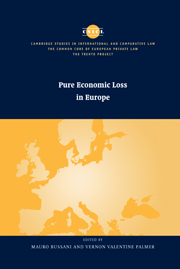Book contents
- Frontmatter
- Contents
- General editors' preface
- Preface
- List of contributors
- Table of legislation
- Relevant statutory and codified provisions (in translation)
- List of abbreviations
- Part I Situating the Frontier
- 1 The notion of pure economic loss and its setting
- 2 The rule against recovery in negligence for pure economic loss: an historical accident?
- 3A Pure economic loss: an economic analysis
- 3B Liability for pure financial loss: revisiting the economic foundations of a legal doctrine
- 4 American tort law and the (supposed) economic loss rule
- 5 The liability regimes of Europe – their façades and interiors
- Part II The comparative evidence: case responses and editors' comparative comments
- Part III Much ado about something
- Bibliography
- Index
2 - The rule against recovery in negligence for pure economic loss: an historical accident?
Published online by Cambridge University Press: 03 November 2009
- Frontmatter
- Contents
- General editors' preface
- Preface
- List of contributors
- Table of legislation
- Relevant statutory and codified provisions (in translation)
- List of abbreviations
- Part I Situating the Frontier
- 1 The notion of pure economic loss and its setting
- 2 The rule against recovery in negligence for pure economic loss: an historical accident?
- 3A Pure economic loss: an economic analysis
- 3B Liability for pure financial loss: revisiting the economic foundations of a legal doctrine
- 4 American tort law and the (supposed) economic loss rule
- 5 The liability regimes of Europe – their façades and interiors
- Part II The comparative evidence: case responses and editors' comparative comments
- Part III Much ado about something
- Bibliography
- Index
Summary
Introduction
The history of a rule can shed some light on its merits. We may be less inclined to abolish a rule if we discover that legal systems have done so and later had to bring it back, finding that they could not live without it. Bernard Windscheid, the great nineteenth-century German jurist, counselled his contemporaries not to try to abolish the doctrine of changed circumstances in contract law: ‘Thrown out the door it comes back in again through the window.’ The drafters of the German Civil Code of 1900 did try to abolish it, only to have the German courts bring the doctrine back two decades later. Conversely, we may be more inclined to abolish a rule if we find that it was adopted because of the accident that a certain approach to law, which is now rightly discredited, was in fashion at the time it was adopted. In this chapter, we will see that the rule against recovery for pure economic loss was the result of such an accident. It was adopted comparatively recently, at the turn of the last century in Germany and England, because of a conceptualistic argument about the difference between rights against all the world and rights against a particular contracting party which would not be compelling today. It became enshrined in the German Civil Code and English precedent and lived on largely because of judges’ respect for them.
Our first step will be to see that before the turn of the last century, the problem of limiting recovery for negligence either was not faced squarely or was resolved in other ways.
- Type
- Chapter
- Information
- Pure Economic Loss in Europe , pp. 25 - 56Publisher: Cambridge University PressPrint publication year: 2003
- 9
- Cited by

